Search
Guidelines for posting
In the absence of a flair system on lemmy yet, let's try to make it easier to scan through posts by type in here by using tags:
- [meta] for discussions/suggestions about this community itself
- [article] for news articles
- [blog] for any blog-style content
- [video] for video resources
- [academic] for academic studies and sources
- [discussion] for text post questions, rants, and/or discussions
- [meme] for memes
- [image] for any non-meme images
- [misc] for anything that doesn't fall cleanly into any of the other categories
Additionally, it is preferred (although not mandatory) to post a brief submission statement in the body of link posts. This is just to give a brief summary and/or description of why you think it's relevant here. Hopefully this will encourage more discussion in this community.
Kamala Harris is going more YIMBY — and housing experts are optimistic
Kamala Harris unveiled the first details of her economic agenda on Friday, including efforts to address the housing crisis with new construction.

For anyone looking from the all feed and confused what that means, YIMBY refers to "yes in my back yard" as opposed to the common refrain of people who profess they want more housing/public infrastructure/etc. but "not in my backyard" (called NIMBYs). The problem with NIMYism is that NIMBYs exist everywere so you have troubling building anything ever if one sticks to that mindset
Opinion | Yes In My Backyard: The Case for Housing Deregulation
It’s rare that one policy can solve a wide range of issues, but making housing more affordable just might be one of them.
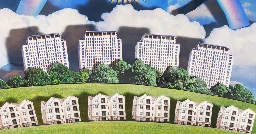
Montreal becomes largest North American city to eliminate mandatory minimum parking spots
Montreal is the latest city to eliminate mandatory parking minimums, and the largest North American city to have done so.

cross-posted from: https://lemmy.world/post/16703609
Opinion: Making housing more affordable means your home’s value is going to have to come down
Politicians are generally not in the business of saying things that voters don’t want to hear
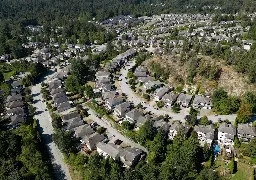
Non-paywall link: https://archive.is/fc2ci
Eliminating 'parking minimums' helped U.S. cities. Could it work here? | CBC
Ottawa recently announced they're considering removing their mandatory parking minimums. For context, parking minimums are extremely arbitrary, based on pseudoscience, and are a key barrier to housing development.
Opinion: Lowering Canada’s high housing costs is also a recipe for raising our notoriously low productivity
Highly restrictive zoning in economically dynamic places not only raises housing prices there, it leads to lower economic output nationwide
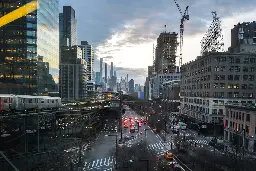
Non-paywall link: https://archive.is/J2cSo
Turns out the housing crisis is awful for the economy at large.
Vancouver's new mega-development is big, ambitious and undeniably Indigenous - Macleans.ca
In B.C., Indigenous nations are reclaiming power and wealth for their own citizens—no matter what the neighbours think
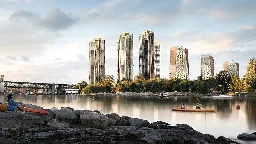
How NIMBYs are helping to turn the public against immigrants | Vox
In this house, we believe that high rents fuel nativist backlashes.

I've seen this in Canada waaaay too much. Instead of rightfully directing their anger at screwed-up land use restrictions and a draconian zoning code, people who are normally pro-immigration are rapidly turning anti-immigrant because of the housing crisis.
Why State Land Use Reform Should Be a Priority Climate Lever for America
RMI analysis shows enacting state-level land use reform to encourage compact development can reduce annual US pollution by 70 million tons of carbon dioxide equivalent in 2033.
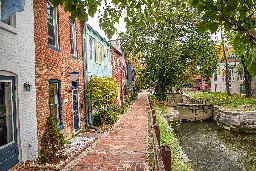
>New analysis from RMI finds that by encouraging better-located, less car-dependent communities, we can solve the nationwide housing shortage while dramatically cutting pollution.
'I was elected to slow down development,' Pointe-Claire mayor tells Poilievre | Montreal Gazette
The federal Conservative leader held a news conference Thursday outside the Fairview Pointe-Claire shopping centre to denounce bureaucracy that he says has stalled housing projects.
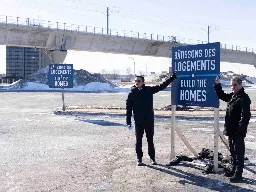
For reference, Pointe-Claire is right next to a new automated light metro station, so blocking housing there is doubly harmful, as it sabotages the potential ridership of a brand new rapid transit system.
The Culture War Tearing American Environmentalism Apart | The Atlantic
In Minneapolis, the housing shortage has fractured the green community.
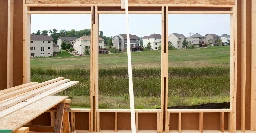
Non-paywall link: https://archive.is/l991o
Australian housing wealth is meaningless, destructive and fundamentally changing our society | The Guardian
High-priced homes do not create wealth, Alan Kohler says, they redistribute it. Now financial success is largely a function of geography, not accomplishment
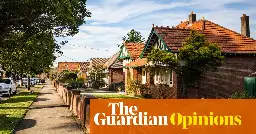
cross-posted from: https://lemmy.world/post/8967868
> This op-ed details how housing has gotten faaaar more expensive over the past several decades but without corresponding wage growth, leaving it increasingly unaffordable. The author (correctly) argues that this is due to the rising land values, which does not represent true wealth creation and is rather simply a vehicle for wealth redistribution from the younger and working class to the older and landed.
Rents Are Falling in Some US Cities, Thanks to New Apartment Construction
Renters in some of the fastest-growing US cities are finally getting some relief after a few years of dizzying increases as developers roll out droves of new apartments.
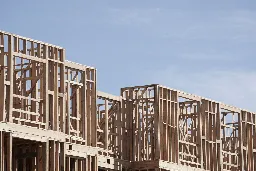
YIMBYism works, y'all.
Non-paywall link: https://archive.ph/HLM7s
Edmonton passes density-boosting zoning bylaw allowing three-storey apartments and row housing citywide
Edmonton city council passed the zoning bylaw rewrite meant to boost housing density citywide after a lengthy public hearing.
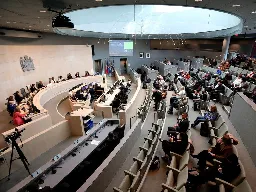
> Property owners in Edmonton will be able to build three-storey apartment buildings, townhouses, rowhouses or duplexes with up to eight units in any residential area citywide starting next year.
> Edmonton city council voted 11-2 Monday morning to pass the revised zoning bylaw, which ends so-called “exclusionary” zoning that limited many residential zones to only single-family homes plus garden or backyard suites. Councillors Jennifer Rice and Karen Principe were opposed. The law comes into effect Jan. 1.
Trudeau wants cities to change zoning rules. Why does that matter?
The Housing Accelerator Fund, a $4-billion federal funding program, earmarks funds for municipalities to support housing. These incentives are tied to zoning changes.

> “A lot of people don’t realize, one of the reasons that certain communities in this country don’t have enough homes is because it’s literally illegal to build the kinds of homes that people could live in,” Fraser said on Friday.
> In much of the country, zoning restrictions mean developers are only allowed to build either single-family homes or condo towers in residential areas. There is a huge chunk of housing options, often referred to as “missing middle housing,” that does not get built.
'A paradigm shift': Liard First Nation tackles housing crisis with timber home kits, new production plant | CBC
Fifteen unique kit-set timber homes have sprung up in the forest outside Watson Lake, Yukon, created by — and for — members of the Liard First Nation (LFN).
The project, run by the First Nation's economic development corporation First Kaska, is being billed as a game changer.
The frame parts are cut on-site at a brand new production plant, with three different floor plans available.
It takes five days to prepare the frame for each house and just one day to piece the numbered frame parts together on the building site.
Watson Lake is grappling with a housing crisis, and LFN Chief Stephen Charlie said the project is "a paradigm shift."
Tthe project eliminates the supply chain issues that make it difficult to build new homes, he said.
Charlie said it's created about 50 jobs and will go a long way toward ensuring the well-being and long-term security of his people.
"It's a complete cycle. It's a benefit for our whole community and people and nation in the process. My vision is that we become the first First Nation north of 60 without a housing crisis. Just think of the legacy that's going to be established for future generations — that we don't have to worry about housing," he said.
"We're taking control of our own destiny … and it's not just the First Nation that it's moving forward, it's the whole community as well."
Liard First Nation member Mike Gagnon said the chance to train and work as a carpenter on the project turned his son's life around. Gagnon said his son had gone from a battle with leukemia and heavy use of alcohol to a good job and savings.
"He's just taken it and run with it. I'm really proud of him," he said.
A former builder himself, Gagnon said the houses were among the warmest and toughest he'd seen.
They feature 20 centimetres of insulation in the walls and almost 23 in the roof.
"I've never seen it. And these are well-built homes. As you can see, these are well-constructed. They're well-organized. You look at the floor plans and these are unreal. These homes — you ain't ever going to get a better one. And this is all because of Stephen [Charlie]."
First Kaska hopes to complete the first 15 homes by the end of the year and six more after that.
They will be given to members of the Liard First Nation who most need them, including young families and people living in crowded situations.
"That's 21 homes. That's probably like 60 people that can be alleviated from bad situations," Charlie said.
Eventually, Charlie said, the goal would be to demolish and replace other mouldy or derelict homes that members are living in.
First Kaska plans to scale up its production plant, allowing it to produce frames in just one day.
That would create a surplus of supply, Charlie said, meaning First Kaska could begin to supply the frames to other communities across the North.
Charlie said some other First Nations have already expressed interest.
The Big City Where Housing Is Still Affordable | The New York Times
Tokyo has succeeded in maintaining an abundance of affordable housing because it has no downtown, many railroads and laws that make it easy to build.

Non-paywall link: https://archive.ph/VIpSH
Tokyo is the most populous city in the world, and yet
> Two full-time workers earning Tokyo’s minimum wage can comfortably afford the average rent for a two-bedroom apartment in six of the city’s 23 wards. By contrast, two people working minimum-wage jobs cannot afford the average rent for a two-bedroom apartment in any of the 23 counties in the New York metropolitan area.
The reason why? It's easy to build new housing in Tokyo.
> In Tokyo, by contrast, there is little public or subsidized housing. Instead, the government has focused on making it easy for developers to build. A national zoning law, for example, sharply limits the ability of local governments to impede development. Instead of allowing the people who live in a neighborhood to prevent others from living there, Japan has shifted decision-making to the representatives of the entire population, allowing a better balance between the interests of current residents and of everyone who might live in that place. Small apartment buildings can be built almost anywhere, and larger structures are allowed on a vast majority of urban land. Even in areas designated for offices, homes are permitted. After Tokyo’s office market crashed in the 1990s, developers started building apartments on land they had purchased for office buildings.
N.S. women fleeing domestic abuse decry lack of affordable housing | CBC
Those escaping domestic violence and abuse struggle to find affordable housing, providing yet another barrier to survivors escaping abusive partners.
This is yet another sobering example of why we critically need YIMBY and pro-housing policies.